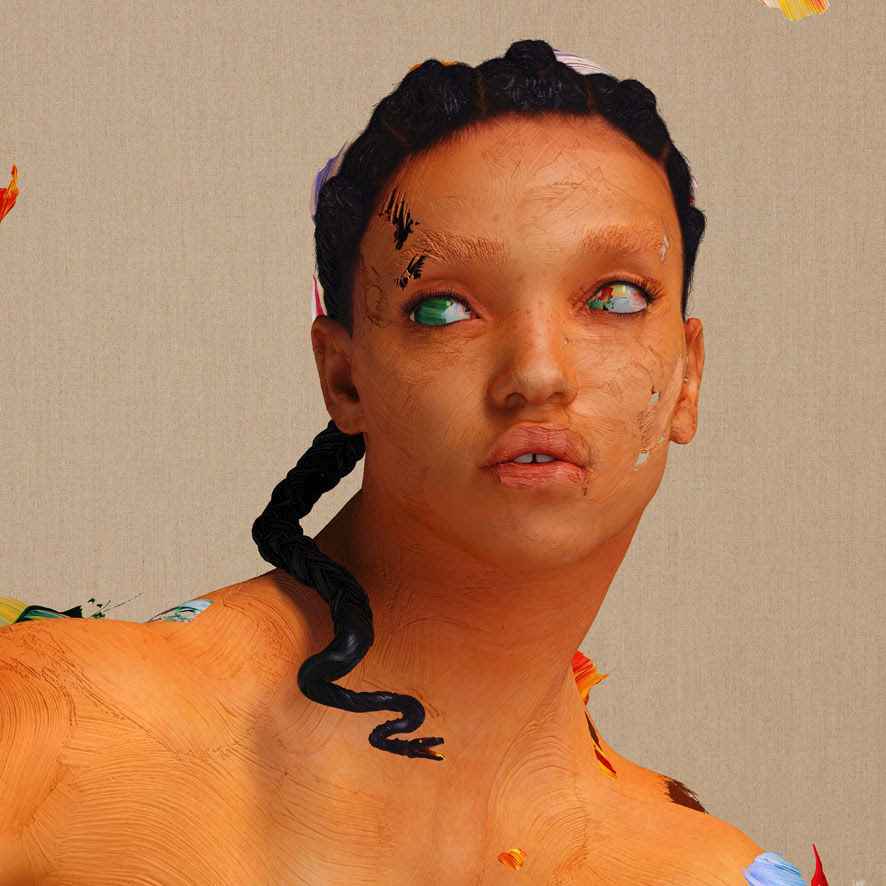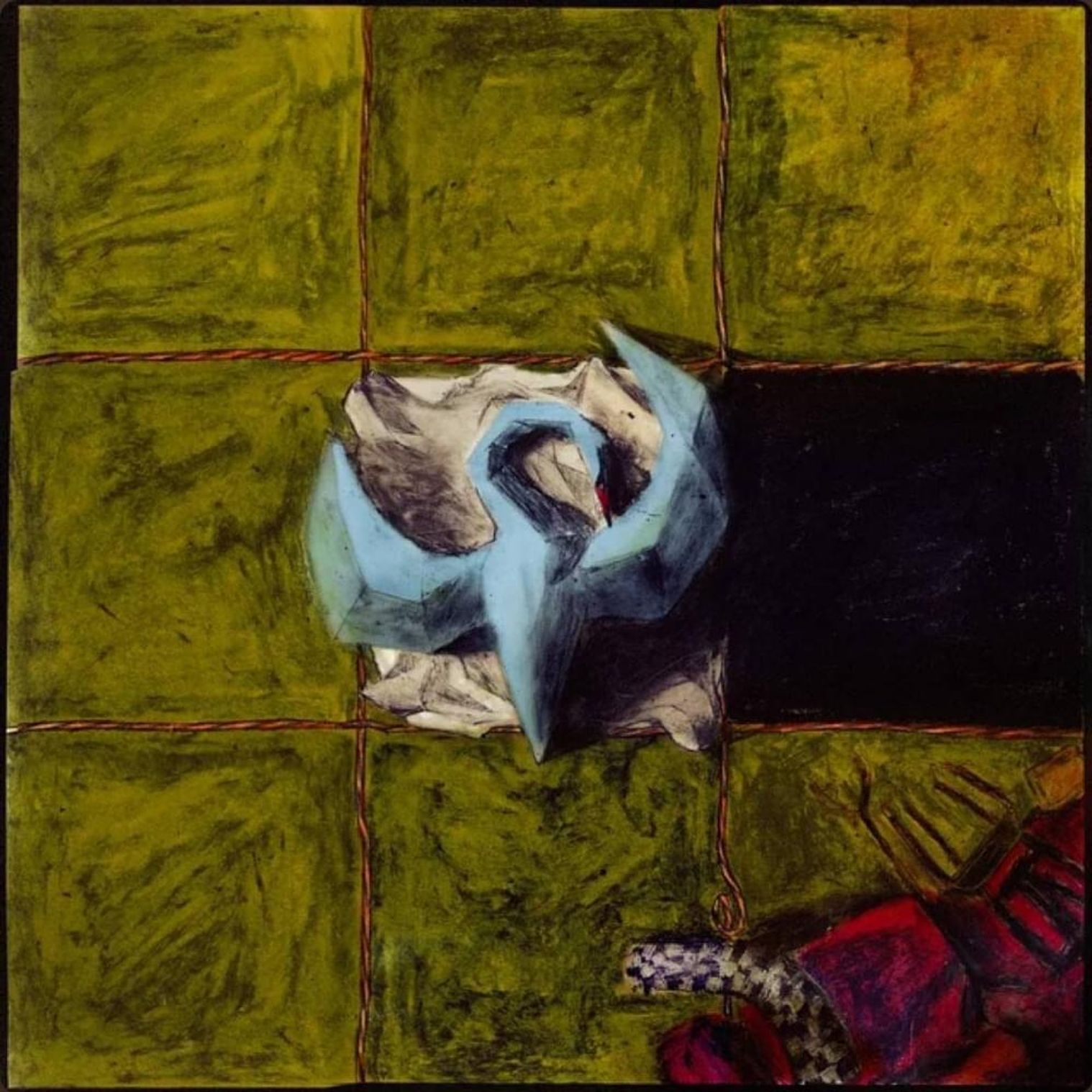FKA Twigs' music has always been physical. On LP1, that physicality expressed itself as dominant, aggressive; on the M3LL155X EP, she toyed around with the idea of submission, what it feels like to be consumed. On her long-awaited sophomore album, MAGDALENE, that physicality is desperate, born out of a desire to serve and be wanted. Her former dominance has been tested and Twigs feels weak. It's an important step in breaking down the perception of herself as an avatar for pure power, someone who is so intensely in control of her art, her body, her life.
"I sometimes find that a certain type of enforced empowerment is very oppressive," she said in a recent interview with Pitchfork. "I mean, I am powerful and independent -- and incredibly vulnerable and sensitive. As a woman of color, this idea that I need to be a Nubian queen all the time is very stressful. I do find it problematic to always feel like your icons are always strong and always OK. If that is somebody’s idea of slaying in this time, it’s wildly off the mark."
MAGDALENE pulls back the curtain on Tahliah Barnett the person, or at least as much of her as she wants us to see, and that curtain is florid and opulent, frequently unsparingly beautiful. It's hard to overstate just how pretty of an album MAGDALENE is. There are popping string arrangements, samples of church choirs, great big heaving breaths. Alongside a handful of outside producers, among them Nicolas Jaar and Arca, Twigs constructed sound designs worthy of Renaissance architecture.
In an interview with Rolling Stone a few years ago, Twigs compared the way she makes a song to the method Michelangelo used to create a sculpture: "I put in everything I can think of — everything, everything -- until it’s just a massive wall, sometimes with no BPM, no structure, nothing. Then the next day I'll go in and just chip away at it and keep on chipping." MAGDALENE makes all the music she's made before sound claustrophobic -- impressive considering her songs were always praised for doing so much with so little.
The problems that Twigs sorts through are MAGDALENE are not necessarily our problems. In 2018, she opened up about her health problems, the six fibroid tumors that she had removed from her body, which on the album she likens to "apples, cherries, pain." What she's been less open about, though, is the last few years that she's spent as tabloid fodder, a weird side hustle for an artist that has always presented herself as deeply interior. Her high-profile relationships with Robert Pattinson and Shia LaBeouf have evidently had an effect on her, and not for the better. On album opener "thousand eyes," she feels the public pressure to succeed in these attachments. "If you don't pull me back, it wakes a thousand eyes," she sings. On "cellophane," she pleads: "They want to see us alone/ They want to see us apart." The paparazzi are outside her door, cameras waiting to catch a glimpse of unhappiness, dissatisfaction, waiting for her to fail, as if the failure of a relationship is a damnation of her own self-worth.
She spends a lot of time on MAGDALENE examining what it means to be part of someone and then not. Not too many people can relate to dating two world-famous celebrities, but most people understand the feeling that you'll never find love again. On "mirrored heart," she looks at all those around her who have found their other halves. "And for lovers who found a mirrored heart/ They just remind me I'm without you," she sings, her voice cracking as she asks and answers her own devastating questions: "Did you want me all?/ No, not for life/ Did you truly see me? No, not this time." Sexuality has become something more interior for Twigs on MAGDALENE. Where before she used it as a weapon, now it is a respite to keep herself feeling safe. She treats femininity with a religious reverence -- an orgasm is turned into hymnal coos on "daybed," masturbation used as a method to block out the stressors of the outside world: "Active are my fingers/ Faux my cunnilingus/ Dirty are the dishes/ Many are my wishes."
Twigs finds a kindred spirit in Mary Magdalene, a follower of Jesus Christ believed by some (including Martin Scorsese) to be his lover. Twigs identifies with Magdalene, a woman who is only thought about through her relationship to a man. But she also finds comfort in that sort of self-sacrifice; she gives Magdalene agency of her own. "I can lift you higher/ I do it like Mary Magdalene," she sings on the title track. "I'm what you desire/ Come just a little bit closer 'til we collide." On "home with you," she ecstatically gives herself up to the role of provider, to being the one to wait and serve. "I didn't know that you were lonely/ If you'd have just told me/ I'd be home with you," she sings, the sound of her twinkling heels running down the hallway like a scene from a movie.
But Twigs has always been fascinated by the power dynamics that play out in any relationship, and "home with you" evades an easy reading. In the same breath that she props herself up as a potential solution to all her partner's problems, she's also questioning how much of herself she has to give away: "The more you have the more that people want from you/ More you burn away, the more that people earn from you," she delivers in a guttural growl. "More you pull away, the more that they depend on you." When Twigs is playing devil's advocate, she manipulates her powerhouse vocals to sound digitally demonic, a stark and pointed contrast to the album's otherwise ornate and classical-inspired compositions.
"I never thought heartbreak could be so all-encompassing," Twigs wrote in a statement that accompanies the album. "I never thought my body could stop working to the point that I couldn't express myself physically in the ways that I have always loved and found so much solace. I have practiced my way into being the best that I could be, but I couldn't do that this time, I was left with no option but to tear down every process I had ever leant into." MAGDALENE is another rewarding chapter in Twigs' discography, another persona for Tahliah Barnett to try on, and it's one that fits well. It's more open, honest, vulnerable, less opaque.
But to be truly transparent, you have to admit your faults -- the ugliness within that makes you more human. MAGDALENE's cover, designed by Matthew Stone, is hideously gorgeous, a Frankenstein-like cast of Barnett's face. The proportions are all wrong, Twigs' eyes are filled in with pastels, there's paint dripping down her shoulders. She's presented as a canvas in progress, photographed somewhere on the journey to becoming, and that's exactly what MAGDALENE is: a rapturous in-between, from being wanted to being found.
MAGDALENE is out 11/8 via Young Turks.
[videoembed size="full_width" alignment="center"]https://youtube.com/watch?v=YkLjqFpBh84[/videoembed]
[videoembed size="full_width" alignment="center"]https://youtube.com/watch?v=p2Rro6TQgpU[/videoembed]
[videoembed size="full_width" alignment="center"]https://youtube.com/watch?v=WEJRyBWpuvA[/videoembed]
[videoembed size="full_width" alignment="center"]https://youtube.com/watch?v=gnmDMAVdaPc[/videoembed]
Other albums of note out this week:
• Mount Eerie's searching and sacred Lost Wisdom Pt. 2, made with the Canadian musician Julie Doiron.
• Moor Mother's dark and dystopian Analog Fluids Of Sonic Black Holes.
• Bloc Party leader Kele Okereke's new solo album 2042.
• Fern Mayo's glittery and acrobatic Week Of Charm.
• Friendship's rambling and warm Dreamin'.
• Wiki's scruffy NYC indie-rap collection Oofie.
• Criminal Instinct's ferocious Terrible Things.
• Pendant's brazen and catchy Through A Coil.
• Clams Casino's heady beat tape Moon Trip Radio.
• Girl Ray's bright and tangy Girl.
• Vegyn's glitchy and slow Only Diamonds Cut Diamonds.
• Charles Rumback & Ryley Walker's improvisational Little Common Twist.
• Foo Fighter drummer Taylor Hawkins & the Coattail Riders' guest-heavy Get The Money.
• Greet Death's moody simmer New Hell.
• Have A Nice Life's noisy and melodic Sea Of Worry.
• The end of Lucy Dacus' year-long 2019 compilation.






